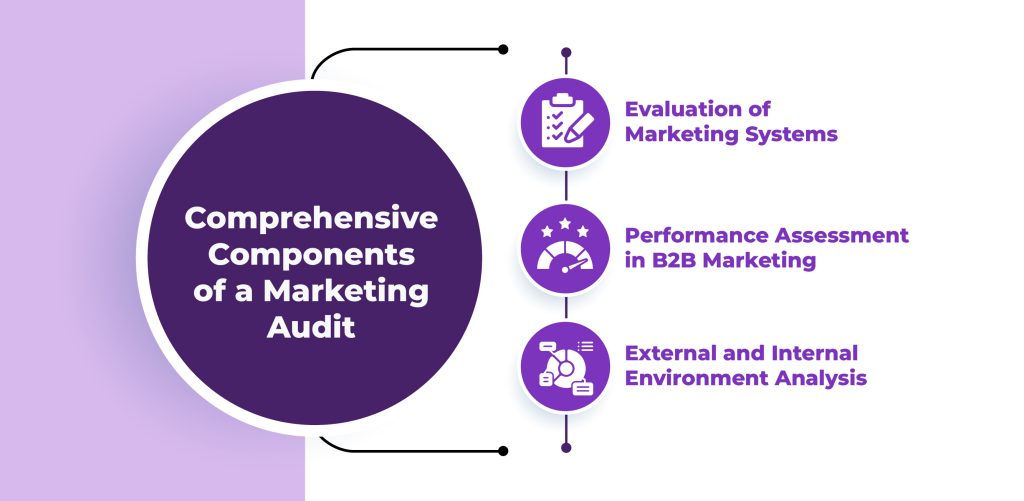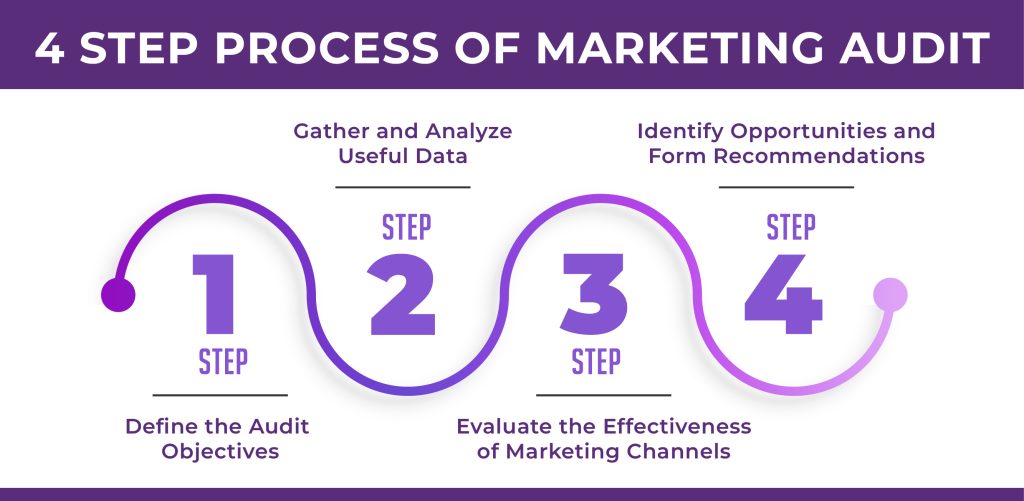
Marketing is constantly evolving, so staying ahead means constantly refining your strategies. In addition to selecting the right tactics, it is also important to understand their effectiveness. This is where the power of a marketing audit comes into play.
It offers a comprehensive analysis of your current marketing efforts, providing a compass in the vast sea of marketing possibilities. By identifying strengths, uncovering areas for improvement, and spotting emerging opportunities, a marketing audit is the critical step every marketer needs to take to ensure their strategy is as dynamic and effective as possible.
By performing a marketing audit, we can examine and analyze marketing efforts in a precise manner. As a result of the meticulous evaluation of our marketing mix, we can calibrate our approach, allocate resources efficiently, and ultimately, achieve better results.
What is a Marketing Audit?
A marketing audit examines your marketing strategies and identifies what works well and what doesn’t. It’s a way to determine how well your plans and practices are performing compared to your goals.
It identifies not only the gaps but also the growth opportunities, thus laying the foundation for making informed decisions moving forward. The audit should be objective to avoid bias, systematic to cover all bases thoroughly, and conducted regularly to detect and address issues as soon as possible.
You now know what Marketing Audit is. Want to take your marketing audit visuals to the next level? Get started with Design Shifu, where creativity meets efficiency. We transform your insights into compelling designs that convey the value of your strategy.
With unlimited requests, rapid turnarounds, and dedicated professional support, we make your audit’s findings not just understandable, but also visually captivating. Design Shifu lets your marketing audit come to life, so your strategies shine.
Comprehensive Components of a Marketing Audit

A Marketing audit with these components in mind sets the stage for informed decision-making, strategic adjustments, and future growth:
1. External and Internal Environment Analysis
This phase is your bird ‘ s-eye view, capturing both the terrain you control and the weather patterns you navigate. Think of it as your brand’s SWOT analysis – identifying the internal strengths and weaknesses, while also keeping an eye on the external opportunities and threats. It’s about understanding the ecosystem your brand lives in, from internal resources to external market dynamics.
2. Evaluation of Marketing Systems
Here, are your marketing strategies and operations. It’s akin to conducting a thorough check-up of how your marketing campaigns are planned, executed, and managed. This step ensures your marketing engine is not just running but is well-oiled and firing on all cylinders, aimed at achieving peak performance.
3. Performance Assessment in B2B Marketing
Special attention is paid to the B2B arena, scrutinizing the effectiveness of your marketing efforts in the business-to-business sector. This entails a deep dive into the impact of your strategies on lead generation, engagement, conversion rates, and ultimately, revenue. It’s about measuring success, identifying gaps, and leveraging insights to foster stronger B2B relationships and outcomes.
What are the Four Characteristics of a Marketing Audit?
A marketing audit isn’t just a one-time rescue operation; it’s a vital routine check-up for your brand’s marketing health. Here’s a breakdown of its key characteristics:
1. Routine and Regular
Think of a marketing audit as your brand’s regular health check-up, not just an emergency call during tough times. Regular audits help keep your marketing strategy fit, ensuring you’re always prepared, not just reactive.
2. All-Inclusive
It’s about taking a holistic view of your marketing efforts. A marketing audit doesn’t pick and choose; it assesses everything from A to Z in your marketing playbook. This approach ensures no stone is left unturned, from broad strategies to specific campaigns.
3. Methodical Approach
This is where the marketing audit becomes a detective, systematically investigating your brand’s environment, strategies, objectives, and outcomes. It’s a structured deep dive that aims to highlight areas for enhancement, guiding both immediate fixes and long-term strategies.
4. External Perspective
While internal teams can certainly conduct a marketing audit, bringing in an independent consultant adds a layer of objectivity and expertise. An external auditor brings fresh eyes and unbiased insights, which can be crucial in identifying blind spots and opportunities for improvement.
6-Step Process of Marketing Audit

1. Chart Your Course
First up, decide on the scope of your audit. Are you aiming for a bird’s-eye view with a comprehensive audit, or do you need a deep dive into specific areas with a systematic audit? Understanding the breadth and depth of what you’re examining will guide your journey from the outset.
2. Set Your Destination
Define clear, measurable objectives for your audit. Whether you’re looking to enhance the customer journey, assess the performance of social media campaigns, or update customer personas, having specific goals will keep your audit focused and actionable.
3. Know Your Travelers
Create detailed customer personas. By understanding who you’re marketing to, you can tailor your strategies to resonate more deeply and avoid misdirected efforts that don’t reach the right shores.
4. Scout the Horizon
Identify your competition. It helps you gauge where you stand in the market and uncover strategies that might give you a competitive edge. It’s not just about knowing who else is out there; it’s about understanding what they’re doing right and where you can carve out your own niche.
5. Collect Your Compass Points
Data is your compass in the vast sea of marketing. Collecting data across various touchpoints gives you the insights needed to navigate effectively. This could range from ad performance metrics to customer engagement rates, painting a comprehensive picture of your marketing’s current landscape.
6. Interpret the Stars
With all the data in hand, the next step is to analyze it in the context of your goals. An experienced auditor can help here, connecting the dots to reveal the bigger picture of how your marketing efforts are performing and how they interrelate.
Best Analytical Tools for Processing Marketing Audit Data
Each of these tools brings its strengths to the table, whether it’s deep-diving into SEO, understanding user behavior, optimizing conversions, or gaining a competitive edge:
1. Google Analytics 4 (GA4)
Your go-to for website traffic analysis, GA4 offers deep dives into user behavior, campaign performance, and conversion tracking. Its Explorations feature is a gold mine for custom insights beyond standard reports.
2. Ahrefs
The Swiss Army knife of SEO, Ahrefs helps you audit your site, spy on competitors, and refine your content strategy. Its Opportunities report is like having an SEO consultant pointing out your next moves.
3. Google Search Console (GSC)
Direct from the search engine giant, GSC provides unmatched insights into your website’s visibility on Google, helping you optimize for better search performance.
4. Mixpanel
Tailor-made for product analytics, Mixpanel shines in tracking user interactions, evaluating feature adoption, and identifying friction points within apps and e-commerce platforms.
5. Microsoft Clarity
By offering heatmaps and session recordings, Clarity allows you to visually understand user behavior, making it an invaluable tool for spotting UX issues.
6. Visual Website Optimizer (VWO)
VWO excels in A/B testing and conversion optimization, helping you experiment with website elements to find what truly resonates with your audience.
7. Brand24
This media monitoring tool keeps you in the loop about brand mentions across the web, providing insights into public perception and campaign reach.
8. Klipfolio
Klipfolio brings all your marketing data under one roof, offering customizable dashboards that give you a holistic view of your performance across channels.
9. ProfitWell
Specifically designed for subscription-based businesses, ProfitWell helps you track key financial metrics, offering insights into growth and retention strategies.
10. vidIQ
For YouTube marketers, vidIQ offers deep analytics and optimization recommendations to boost channel performance and video engagement.
11. HubSpot
More than just an analytics tool, HubSpot offers a comprehensive platform for managing all aspects of digital marketing, sales, and customer service, with robust reporting features.
12. ChatGPT
While not a traditional analytics tool, ChatGPT can provide qualitative analysis, offer strategic advice, and even help interpret data from other tools, making it a versatile assistant in your marketing audit toolkit.
What is a Marketing Audit Report?
An in-depth examination of your strategies, the kind that leaves no stone unturned. That’s the essence of a marketing audit report. It’s your marketing world under a microscope, examining every campaign, and every tactic, and measuring them all against your goals.
Marketing audits are like preventive care for your strategies, helping you spot where you’re nailing it and where you’re just not hitting the mark. They’re your chance to realign resources, ensuring your team and budget are focused where they’ll make the biggest impact.
It’s a thorough examination of how each activity contributes to your overall goals, assessing the performance of every channel and funnel.
“Ready to see your marketing strategy in a new light”? Design Shifu is here to visually enhance your marketing audit reports, turning complex data into clear, compelling visuals. With our unlimited design requests and rapid turnaround, we ensure your audit’s insights stand out and drive impactful decisions.
Elevate your strategy’s presentation and make every insight pop with Design Shifu’s expert design services. Experience a marketing audit that is not just thorough, but also visually stunning. Choose Design Shifu today and transform the way you view your marketing performance.
B2B Marketing Audit vs. Digital Marketing Audit vs Internal Marketing Audit
| Aspect | B2B Marketing Audit | Digital Marketing Audit | Internal Marketing Audit |
| Focus | Concentrates on the strategies and tactics used to reach other businesses, including relationship-building, lead generation, and content marketing tailored for a professional audience. | Primarily evaluates online marketing efforts such as SEO, PPC, social media, content, and email marketing, focusing on digital channels and platforms. | Looks inward at the company’s marketing department or team, assessing processes, strategies, team skills, and resource allocation. |
| Objective | To identify the effectiveness of marketing efforts in generating leads and converting them into customers within a B2B context, focusing on long sales cycles and high-value contracts. | To gauge the performance of digital campaigns and initiatives, analyzing metrics like website traffic, conversion rates, and ROI from digital channels. | To ensure that internal resources are being used efficiently and that the marketing team’s strategies align with the company’s overall goals. |
| Key Areas of Evaluation | Sales funnel efficiency, lead quality, account-based marketing strategies, and content relevance for a professional audience. | Website performance, digital presence, online audience engagement, and digital campaign effectiveness. | Team structure, internal communication, marketing processes, strategic alignment, and budget utilization. |
| Outcome | Insights into improving B2B relationships, enhancing lead generation tactics, and better targeting of professional clientele. | Recommendations for optimizing online visibility, improving digital user experience, and increasing engagement across digital platforms. | Strategies for enhancing team productivity, streamlining marketing operations, and better-aligning marketing efforts with business objectives. |
| Typically Conducted by | External consultants specializing in B2B markets or in-house teams with a deep understanding of industry-specific B2B dynamics. | Digital marketing experts or agencies with a focus on online marketing analytics and strategies. | Internal auditors or senior marketing leaders aiming to improve departmental effectiveness and strategic impact. |
Frequently Asked Questions:
1. Which analysis is made up of components such as financial analyses and marketing audits?
Strategic Business Analysis involves components like financial analyses and marketing audits to evaluate a company’s position and strategy.
2. Which marketing function deals with establishing goals, objectives, processes, and procedures?
Marketing Planning is the function that involves setting goals, objectives, and outlining the strategies and actions to achieve them.
3. If a campaign falls short of its target goal, how might it be described?
If a campaign falls short of its target goal, it might be described as underperforming or not meeting its objectives.
4. Which of the following best describes a social media audit?
A social media audit involves evaluating and optimizing a brand’s profiles and strategies across social platforms to improve its online presence.
5. Which step follows the marketing mix step in the process of marketing management?
Following the marketing mix, the next step in the marketing management process is typically implementation and control, where strategies are executed and monitored for effectiveness.
6. What is the Marketing Environment?
The Marketing Environment encompasses external and internal factors that affect a company’s marketing operations, including economic, social, technological, and competitive elements.
7. How often should a Marketing Audit be completed?
A Marketing Audit should ideally be completed annually, or whenever significant changes occur in the market or company to ensure strategies remain effective and aligned with goals.
8. What is the Role of a Marketing Auditor?
The Role of a Marketing Auditor is to conduct an objective and systematic evaluation of the marketing activities, including strategies, goals, and outcomes, to identify areas for improvement and ensure alignment with the company’s objectives.


